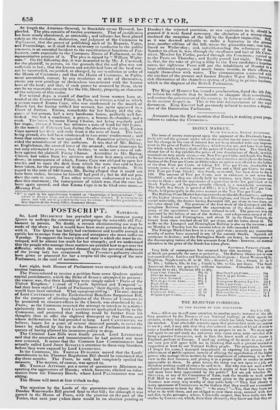Last night, both Houses of Parliament were occupied chiefly with
routine business.
The Peers refused to receive a petition from some Quakers against capital punishments, which the Duke of SUSSEX attempted to present : the reason was, that their Lordships were simply called " Peers of the United Kingdom," instead of " Lords Spiritual and Temporal "- had they been styled " Lords of Parliament," their dignity, it appeared, would have been satisfied. What egregious trifling ! The ante. dment of Lord CANTERBURY to the Ecclesiastical Benefices Suspension Bill, for the purpose of allowing chaplains of the House of Commons to be promoted to sinecure offices in the Chute's, was abandoned by the Peers; as the Commons resented the attempt to interfere in a matter exclusively their own. Lord CANTERBURY apologized humbly to the Commons, and protested that nothing could be further front his thoughts than to offer the slightest disrespect to that House, over whose deliberations he had presided so long. Lord CANTERBURY, we believe, hopes for a grant of several thousand pounds, to cover the losses he suffered by the fire in the Houses of Parliament in conse- quence of having allowed his insurance-policy to drop. The Criminal Law Bills were finally passed. Lord LYNDHURST said that the anomalies and inconsistencies be bad pointed out were now removed. It seems that the Common Law Commissioners had actually called Lord JOHN RUSSELL'S attention to these very blunders, before they were exposed by Lord LYNDHURST. In the Commons, Mr. THOMAS DUNCOMBE moved that the Lords' amendments to his Theatres Regulation Bill should be considered that day three months. The Peers, be said, had completely spoiled the measure. The motion, of course, was agreed to. Mr. THOMAS ATTWOOD put a series of questions to Ministers re- specting the aggressions of Russia ; which, however, elicited no infor- mation from the Treasury Bench, where Lord PALMEItSTON was not sitting.
The House will meet at four o'clock to-day.


























 Previous page
Previous page